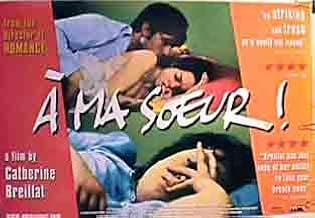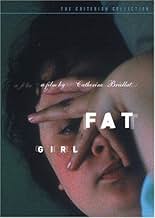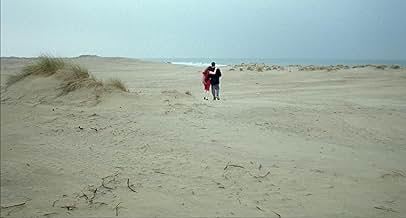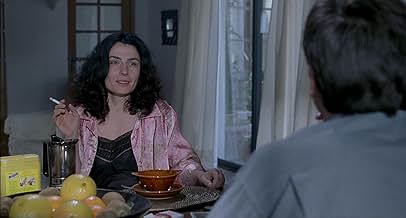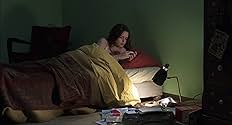Two sisters confront their sexual attitudes and experiences while on a family holiday.Two sisters confront their sexual attitudes and experiences while on a family holiday.Two sisters confront their sexual attitudes and experiences while on a family holiday.
- Awards
- 4 wins & 3 nominations total
Claude Sésé
- Police Officer
- (as Claude Sese)
- Director
- Writer
- All cast & crew
- Production, box office & more at IMDbPro
Featured reviews
Director Breillat is back and, as she did with "Romance", pushing the bounds of censorship in an intellectually challenging fashion. The story follows the sexual development of two sisters in their early teens. Their middle class family embody the usual social mores and protective attitudes. Moreover, the story makes us aware of the legal dilemma of under age sex, undertaken as a matter of conscious choice and with proper protection by the 15-year old (older) sister with a boyfriend only a few years her senior (ie the relationship would be legal in Netherlands but not in many countries, including France). These are two fairly "normal" sisters, although the younger one is excessively overweight and only fantasizes about getting a boyfriend. There is some possible interpretation that the 15-year old's psychological development would progress more soundly were she not (initially) fettered by taboos over her own virginity. In one scene, a TV in the background has a Breillat-type character being interviewed and giving her philosophy about the intrinsic nature of sex, how it is something common to us all and that can be understood by anyone, and that we are all alike inasmuch as no-one is perfect. The characters and scenes are painted brilliantly, the sibling rivalry coupled with intense sisterly bonding, the mother driving at night and, as many people will have, with a lack of sleep and so not as perfectly safely as normal. It is the realism and ordinariness of the situations that keep us on the edge of our seats. The dialogue has the realism that suggests youngsters may have suggested some of the lines, with their observations that have the power to startle us out of complacency. The use of actors so young in fairly explicit scenes will be a matter of great concern, but Breillat is serious about her work and convinces us that she is not pandering to sensationalism but raising valid questions about how we effectively handle the challenges presented by precocious adolescents. The film is more polished than Breillat's earlier work and has an unnerving denouement, well-delivered.
6sol-
Oddly titled 'Fat Girl' for international release, the ambiguity of the original French title of this Catherine Breillat movie is quite important as the film is equally about two sisters: one conventionally pretty and the other slightly overweight. Roxane Mesquida and Anaïs Reboux share excellent chemistry in the respective roles as a family vacation affords them a chance to indulge in their emerging sexual appetites. At times, the girls are highly competitive with Mesquida expressing contempt for the younger Reboux to look cool in front of an Italian law student they befriend; at other times though, the sisters laugh together and share intimate secrets like lifelong best friends. Some have been critical of the explicit sexual scenes here, however, Breillat keeps them minimal and a distance; indeed, in the moments when Mesquida is intimate with her newfound boyfriend, we hear everything but see nearly nothing as the camera focuses on Reboux's face, pretending to be asleep in the hotel room she shares with her sister. If there is something to hold against the film, it is the meandering second half with a lot of lengthy drives taking up much of the screen time with tension evaporating once Mesquida has gone all the way. An unexpected plot turn in the final ten minutes of the film does, however, ensure that the movie ends on a thought-provoking (if not necessarily satisfying) final note.
This film is a necessary act of violation on its viewers. A pure, lethal injection of dramatic suffering which is beautifully rendered but left me feeling devastated by its intensity. Breillat is a director who has already made shock-waves with her last film "Romance". In her latest piece of disturbing cinematic violence, she takes us inside the life of a 13 year old overweight girl inside an average, upper middle-class family. On a holiday away with this family, we experience her exposed difference as her 15 year old sister begins to experiment with sex, often with her young sister a passive spectator. The parents are indifferent creatures, affected mainly by social pressures and appearances. Unaware - or possibly simply disinterested - in their daughters lives, they miss the painful undersides of the two girls forced closeness. Breillat offers more explicit sex, erections, and some extremely gruelling violence. I recommend this film but its intelligence and emotional truth is, necessary.
This is a film that is difficult to say you "liked." It gives a view of the different facets of cruelty. Anais (the "Fat Girl" of the title) is buffeted with cruelty and indifference at every turn--that directed toward her and that she witnesses. Her corpulence is both an attempt to insulate herself against these assaults but at the same time, indicative of her internalization of them. But ultimately, the film is similarly an assault on the viewer, be warned. It stings.
At the NY Film Festival's Q&A with Breillat, she expressly forbid seeing "Fat Girl" (as she prefers to call it) as a morality play. She eluded any attempts to draw her into conclusions about her film, insisting that she is not a moralist.
What is clear from the questions she asks, however, is that she views sex with a certain contempt, especially as regards the male role in the act. The men that are in the film are either insensitive, duplicitous or murderous. Breillat's intent is to show how adrift any adolescent girl is when it comes to sexuality and to somehow convey that to an adult audience. She counseled young Anais during filming by saying, "We are making a film that I don't even think you can see when it is done, but it is not for you. It is supposed to scare adults."
What is clear from the questions she asks, however, is that she views sex with a certain contempt, especially as regards the male role in the act. The men that are in the film are either insensitive, duplicitous or murderous. Breillat's intent is to show how adrift any adolescent girl is when it comes to sexuality and to somehow convey that to an adult audience. She counseled young Anais during filming by saying, "We are making a film that I don't even think you can see when it is done, but it is not for you. It is supposed to scare adults."
Did you know
- TriviaA man was arrested by Canada Customs and Revenue Agency in July of 2003 for importing a copy into Canada, on the grounds that the movie constituted obscene material.
- GoofsAll entries contain spoilers
- Quotes
Anaïs Pingot: When I hate you, I look at you and then I can't.
- Alternate versionsWhen released on home video in the UK, this title was cut by 1 minute and 28 seconds to cut down a scene of sexual assault. Ireland banned it altogether.
- SoundtracksSocial Climber
Performed by Laura Betti
- How long is Fat Girl?Powered by Alexa
Details
Box office
- Gross US & Canada
- $725,854
- Opening weekend US & Canada
- $31,237
- Oct 14, 2001
- Gross worldwide
- $765,705
- Runtime
- 1h 35m(95 min)
- Color
- Sound mix
- Aspect ratio
- 1.85 : 1
Contribute to this page
Suggest an edit or add missing content

![Bande-annonce [OV]](https://m.media-amazon.com/images/M/MV5BNTU0ZWE0ODAtMGUwMS00NWRhLTg1NjUtMTFlNTYxOWFiMzhlXkEyXkFqcGdeQXRyYW5zY29kZS13b3JrZmxvdw@@._V1_QL75_UX500_CR0)



